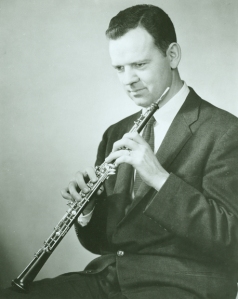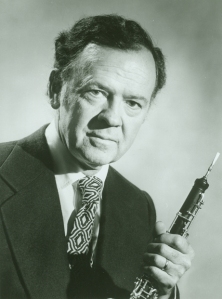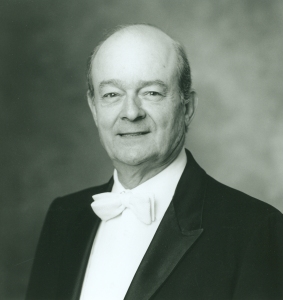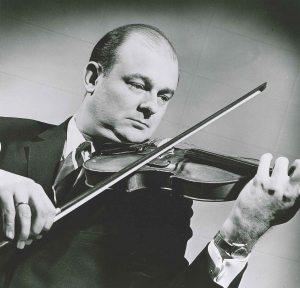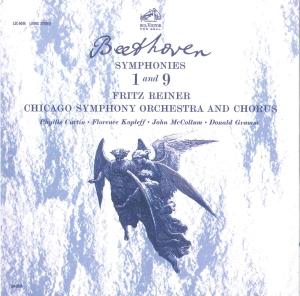You are currently browsing the tag archive for the ‘Northwestern University’ tag.
The Chicago Symphony Orchestra family mourns the passing of Gordon Peters, who served as principal percussion from 1959 until 2001 as well as a conductor and administrator of the Civic Orchestra of Chicago from 1966 until 1987. He died on August 26, 2023, at the age of ninety-two.
Gordon Peters was born on January 4, 1931, in Oak Park and grew up in Cicero, Illinois, where he first studied piano at the age of six. He began his orchestral career in the fifth grade, later performing in the J. Sterling Morton High School Orchestra and Band programs under Louis M. Blaha. As a teenager, Peters was timpanist of the Roosevelt College Orchestra and the Chicago Youth Symphony Orchestra. His primary percussion teachers included Harry J. Brabec (CSO principal percussion from 1951 until 1956), Roy Knapp, Otto Kristufek, José Bethancourt, Clair Omar Musser, Saul Goodman, Morris Goldenberg, and William Street.
Peters spent three years in the U.S. Military Band at West Point. He went on to earn both bachelor’s and master’s degrees from the Eastman School of Music, where he founded the Marimba Masters. This unique seven-member ensemble appeared several times with both the Rochester and Buffalo philharmonic orchestras and played numerous professional engagements in New York state, including radio and television shows with Arthur Godfrey in 1955 and Ed Sullivan in 1958. Peters also studied conducting with Pierre Monteux in Hancock, Maine, and received the Monteux Discipleship Award in 1962. He performed with the Rochester Philharmonic Orchestra under Erich Leinsdorf and was a member of the Grant Park Symphony Orchestra from 1955 until 1958.
In 1959, Peters was invited by Fritz Reiner to become principal percussion of the Chicago Symphony Orchestra, with whom he also appeared as soloist on several occasions. In 1987, he completed a twenty-two-year tenure as conductor and administrator of the Civic Orchestra of Chicago—the CSO’s training orchestra—a post to which he was appointed by Jean Martinon. During this time, the Civic gave fifty-two Chicago premieres (twenty-nine by American composers) and the world premiere of Gustav Mahler’s Tenth Symphony as realized by Chicagoan Clinton Carpenter. Among the works Peters introduced to Chicago audiences were Bartók’s Four Pieces for Orchestra, Varèse’s Amériques, and works by composers as diverse as Carl Ruggles, Frank Proto, Antonio Salieri, and Adrzej Panufnik.

Peters was on faculty at Northwestern University from 1963 until 1968 and served as music director of the Elmhurst Symphony Orchestra from 1968 until 1973. He also was assistant conductor and member of the board of directors of the Chicago Youth Symphony Orchestra for twenty years. In 1993, Peters conducted the Bangor Symphony Orchestra in Maine in a memorial concert honoring conductor and composer Werner Torkanowsky.
He composed the popular Swords of Moda-Ling for percussion ensemble, and he arranged several works for marimba ensemble. In 1975, Peters authored and published The Drummer: Man, an extensive treatise on percussion, in addition to numerous articles and pedagogic outlines.
Peters served as the first national president of the Percussive Arts Society from 1962 until 1966, and in 2004, he was inducted into the society’s hall of fame. He also was a member of the board of directors of the Conductors Guild from 1979 until 1990, and he was a longtime member of the Chicago Symphony Orchestra Alumni Association. In 2000, Terry Applebaum, a former student of Peters’s, endowed the Gordon B. Peters Principal Timpani Chair in the Chicago Youth Symphony Orchestra. In his retirement he enjoyed antiques, graphics, books, gardening, and spending time at a summer home in Hancock, Maine.
Gordon Peters is survived by his widow Elizabeth Page Riggs, and there will be no services.











This article also appears here.
The Chicago Symphony Orchestra family mourns the loss of Jonathan Pegis, who served as a member of the cello section from 1986 until 2018. He died yesterday of natural causes, at home in Waterloo, Iowa. Pegis was sixty-one.
“I am deeply saddened to learn of the passing of Jon Pegis, a very kind person and a wonderful player,” commented Riccardo Muti. “I will remember him and his wonderful contribution to the Chicago Symphony Orchestra.”
Born in Rochester, New York on May 7, 1960, Jonathan Pegis gave new meaning to the phrase “born into a musical family.” He was one of seven children, all whom played string instruments. Pegis began his studies at the Eastman School of Music’s Preparatory Department, where his first teacher was Alan Harris; he also studied with Lee Fiser, Paul Katz, and Lynn Harrell. Pegis completed undergraduate studies at the Cincinnati College-Conservatory of Music. While there, he joined the LaSalle Quartet and viola Donald McInnes on chamber music tours of the United States and Germany. Their 1982 recording of Schoenberg’s string sextet Transfigured Night for Deutsche Grammophon later received Japan’s Tokyo Record Academy prize.
Pegis returned to Rochester in 1984 to become a member of the Rochester Philharmonic Orchestra and to attend Eastman, where he earned a master’s degree and a performer’s certificate. In 1986, he was invited by Sir Georg Solti to join the Chicago Symphony Orchestra’s cello section, a post he held until his retirement in 2018. During his tenure, he frequently performed in chamber music, including concerts on the Chicago Symphony Orchestra Chamber Music Series and the Northwestern University Winter Chamber Music Festival. He also appeared as soloist at Chicago Cello Society concerts, with the Texas Chamber Orchestra, Highland Park Strings, and the Signature Symphony in Tulsa. In 1993, Pegis joined the faculty at Northwestern University, where taught cello orchestral studies until 2012. He also was a regular contributor to the cellobello.org blog.

When he announced his retirement, Pegis expressed, “What a pleasure and memorable journey it has been to be a part of this tremendous organization for over thirty years. A dream come true! These few words are inadequate to express the privilege it has been to share with such an outstanding organization, exceptional colleagues—musicians and staff. I am most grateful for the lifetime of experiences and memories that we made throughout the world!”
Pegis is survived by his wife Dawn, along with sons Michael and Jason from his previous marriage to Lisa Rensberger. Services are pending, and in lieu of flowers, the family has requested memorial gifts to the Tunnel to Towers Foundation and the Chicago Symphony Orchestra.
This article also appears here.

On October 1, 2021, we celebrate the centennial of Margaret Hillis (1921–1998), the founder and first director of the Chicago Symphony Chorus. She led the ensemble for thirty-seven years—from 1957 until 1994—influencing the development of symphonic choruses to a level of precision, polish and refinement akin to the orchestras with which they perform. Hillis’s achievements with the Chicago Symphony Chorus have served as a model which others continue to emulate.
Hillis was born to a prestigious family in Kokomo, Indiana. Her grandfather, Elwood Haynes, invented stainless steel and one of the first automobiles, and her father, Glenn Hillis, was a successful lawyer who narrowly lost the 1940 race for the governorship of Indiana. She was raised to believe she could do whatever she set out to accomplish, and her dream, from the time she was child, was to become an orchestral conductor. However, society had other plans for her. Hillis’s aspiration was not an option for women of her generation. Unable to pursue a direct route for her desired career, she would find her way to the podium through the “back door,” opting to pursue choral conducting instead.
During her youth, Hillis taught herself to play many instruments, settling upon double bass as she entered her formal musical studies at Indiana University. She briefly left college in December 1942 to become a civilian flight instructor with the US Navy, teaching young pilots to fly during World War II. After the war, Hillis completed her degree, and in 1947, she headed to the Juilliard School to study with Robert Shaw, a leader in the field of choral conducting. She was advised that this could be her only way to a conducting career. As one who had been steeped in orchestral music throughout her life, Hillis bravely pursued choral conducting, requiring her to learn an entirely new set of skills. She would quickly adapt, and after only a few short years, she formed her own ensemble in New York—the American Concert Choir—and quickly gained the respect of audiences and critics alike.
The Chicago Symphony Orchestra’s sixth music director, Fritz Reiner, would soon discover Hillis’s outstanding work, and he invited her to start a chorus in Chicago. On March 13, 1958, the newly formed Chicago Symphony Chorus made its debut in Mozart’s Requiem with Bruno Walter conducting. During Hillis’s time as director of the Chorus, the ensemble regularly appeared with the CSO in Chicago and on tour, performing in Carnegie Hall, the Kennedy Center, and in their 1989 European debut at London’s Royal Albert Hall and Salzburg’s Grosses Festspielhaus. Perhaps one of the most noteworthy events during Hillis’s directorship occurred on October 31, 1977, when she replaced Sir Georg Solti on short notice at Carnegie Hall for a performance of Mahler’s Eighth Symphony, garnering international attention.
In addition to Hillis’s success with the Chicago Symphony Chorus, she was recognized in her role of “breaking the glass ceiling” for women pursuing orchestral conducting careers. She was the first woman to conduct the Chicago Symphony Orchestra and the first to regularly conduct a major symphony orchestra, and she contributed generously to the choral profession, establishing the American Choral Foundation, presiding as a founding member of the Association of Professional Vocal Ensembles (now Chorus America), and serving on the National Council of the National Endowment for the Arts. She also established the Do-It-Yourself Messiah tradition and was instrumental in the founding of the Dame Myra Hess Memorial Concerts series, both of which continue to thrive.
Throughout her career, Hillis tirelessly campaigned for the sustenance of professional singers, and she was equally passionate about teaching, serving on faculties of Northwestern and Indiana universities and leading countless conducting workshops. She received many honorary doctoral degrees and numerous recognitions—including nine Grammy awards—however, her greatest achievement was the rich legacy she established as she transformed the choral landscape.
Though Margaret Hillis would earn the respect of the world’s major conductors along with the admiration and affection of many musicians, colleagues, and music lovers, her journey was not an easy one. She deftly circumvented the constant barriers in fields where women were not welcome. Despite the obstacles, Hillis’s legacy lives on, in the continued success of the Chicago Symphony Chorus, in more frequent appearances of women conducting orchestras and in professional choruses that flourish throughout the world.
Cheryl Frazes Hill is associate director of the Chicago Symphony Chorus. She is the author of the forthcoming biography Margaret Hillis: Unsung Pioneer from GIA Publications.
This article also appears here.
Wishing Walfrid Kujala—a member of the Chicago Symphony Orchestra’s flute and piccolo section from 1954 until 2001—a very happy ninety-fifth birthday!
A native of Warren, Ohio, Kujala grew up in Clarksburg, West Virginia, where he started flute lessons when he was in the seventh grade. (His father, a bassoonist, steered him to the flute in order to “save him” from the headaches of reed making.) While attending high school in Huntington, West Virginia, he studied with Parker Taylor, principal flute of the Huntington Symphony Orchestra, and played second flute with the ensemble from 1939 until 1942.
Kujala attended the Eastman School of Music, where he studied with Joseph Mariano, principal flute of the Rochester Philharmonic Orchestra. His college career was interrupted by two and a half years of military service in the U.S. Army, serving in the 86th Infantry Division Band from 1943 until 1946. During his tour of duty in the Philippines, after the end of hostilities, Kujala was briefly a member of the Manila Symphony Orchestra. From Eastman, he received his bachelor of music degree in 1948 and a master’s degree in 1950, and he was a member of the Rochester Philharmonic Orchestra under Erich Leinsdorf from 1948 until 1954. Kujala also served on Eastman’s faculty from 1950 until 1954.
In 1954, sixth music director Fritz Reiner hired Kujala as assistant principal flute of the Chicago Symphony Orchestra, and in 1957, he became principal piccolo, serving in that capacity until 2001. He also performed as principal flute of the Grant Park Symphony Orchestra from 1955 until 1960.
As a soloist, Kujala has appeared under Reiner, Sir Georg Solti, Seiji Ozawa, Antonio Janigro, and Lawrence Foster. He also has soloed at the Stratford and Victoria Festivals in Canada, as well as recitals, chamber music concerts, and master classes across the United States.

Kujala, Gunther Schuller, and Sir Georg Solti following the world premiere performance of Schuller’s Flute Concerto on October 13, 1988 (Jim Steere photo)
Kujala joined the faculty at Northwestern University in 1962 and taught there for fifty years, retiring in 2012. In honor of his sixtieth birthday, his students and colleagues commissioned a flute concerto from Gunther Schuller, and Kujala was soloist in the world premiere with the Chicago Symphony Orchestra and Solti on October 13, 1988. On August 19, 1990, he was soloist in the U.S. premiere of Einojuhani Rautavaara’s Concerto for Flute under Kurt Redel, at the National Flute Association convention in Minneapolis. The Chicago Flute Club’s biennial international piccolo competition is named in his honor.
The author of the textbook The Flutist’s Progress, Kujala also regularly contributes articles and editorial to several publications, including The Instrumentalist, Flute Talk, Music Journal, and Woodwind World. He is a founding board member and founding secretary of the National Flute Association, where he also served as president, vice president, and board chairman. Kujala and his wife Sherry make their home in Evanston.
Happy, happy birthday!
The Chicago Symphony Orchestra family notes with sorrow the passing of Alan Stout, composer and longtime composition and theory professor at Northwestern University. Stout died yesterday, February 1, 2018, at the age of 85.
Stout’s music was first performed by the Orchestra on two concerts given at Northwestern University’s Cahn Auditorium on May 29 and 31, 1967, when Esther Glazer was soloist in Movements for Violin and Orchestra with Henry Lewis conducting. Soon thereafter, the Chicago Symphony Orchestra presented four world premieres by Stout, under the batons of Seiji Ozawa, Sir Georg Solti, and Margaret Hillis, at the Ravinia Festival and in Orchestra Hall.
On August 4, 1968, Ozawa led the world premiere of Stout’s Symphony no. 2 at Ravinia. The work was commissioned by the Ravinia Festival Association through a grant from the Illinois Arts Council, and the performance was made possible by a Composer Assistance Grant from the National Endowment for the Arts.
The symphony was “vivid [and] multi-dimensional . . . a collection of musical rituals,” according to Thomas Willis in the Chicago Tribune. “The work is a marvelous tapestry of textures, combining a superior craftsmanship, a remarkable ear, and encyclopedic knowledge of the inventions of his colleagues, [including] Messiaen, Penderecki, Elliott Carter, and Pierre Boulez . . .”
The composer’s Symphony no. 4 was commissioned by the Chicago Symphony Orchestra in celebration of its eightieth season and dedicated to Georg Solti, who led the world premiere performances on April 15, 16, and 17, 1971. The score calls for a small chorus, and members of the Chicago Symphony Chorus were prepared by assistant director Ronald Schweitzer.
The following year, Solti also led the world premiere of Stout’s George Lieder (Poems from Das neue Reich) on December 14, 15, and 16, 1972, with baritone Benjamin Luxon as soloist.
Stout’s large-scale Passion for Soloists, Chorus, and Orchestra was commissioned by the Chicago Symphony Orchestra with assistance from the National Endowment for the Arts and was dedicated to Margaret Hillis and the Chicago Symphony Chorus. Hillis led the world premiere performances on April 15, 16, and 17, 1976. Soloists included Mary Sauer on organ, Elizabeth Buccheri on piano, along with soprano Phyllis Bryn-Julson, tenors Frank Little and John McCollum, baritones Leslie Guinn and LeRoy Lehr, and bass Monroe Olson.
The premiere of Stout’s Passion, on which the composer worked for over twenty years, was a “monumental undertaking [and] provided the most difficult music the Chorus has undertaken since Fritz Reiner brought Margaret Hillis here in 1957 to found the now internationally known ensemble,” wrote Willis in the Chicago Tribune. “Stout fashions his church Latin text into curtains and tapestries of sound. Like a sonic aurora borealis, they expand and contract as needed, supplying intimate but still objective commentary on an emotional-laden event, creating towering climaxing as the peak points of the action, or providing canopies of tightly woven, often contrapuntal sheets of sound against which other portions of the action can take place.”
The Chicago Symphony Orchestra family joins the music world in mourning the loss of the extraordinary American soprano Phyllis Curtin, a frequent guest artist who performed under three music directors—Fritz Reiner, Jean Martinon, and Sir Georg Solti—between 1957 and 1972. Curtin died on June 5, 2016, at her home in Great Barrington, Massachusetts. She was 94.
Curtin made her debut with the Chicago Symphony Orchestra at the Ravinia Festival in 1957, and she most recently appeared at Orchestra Hall in 1972. A complete list of her appearances with the Orchestra is below (subscription concerts at Orchestra Hall, unless otherwise noted):
July 7, 1957 (Ravinia Festival)
FOSS The Song of Songs
Lukas Foss, conductor
Phyllis Curtin, soprano
April 27 and 28, 1961
BEETHOVEN Symphony No. 9 in D Minor, Op. 125
Fritz Reiner, conductor
Phyllis Curtin, soprano
Florence Kopleff, contralto
John McCollum, tenor
Donald Gramm, bass-baritone
Chicago Symphony Chorus
Margaret Hillis, director
Beethoven’s Ninth Symphony was recorded by RCA on May 1 and 2, 1961, in Orchestra Hall. The recording recently was re-released as part of a sixty-three-disc set featuring Reiner’s complete discography with the Orchestra.
April 26 and 27, 1962
HANDEL Israel in Egypt
Fritz Reiner, conductor
Phyllis Curtin, soprano
Carol Smith, mezzo-soprano
Richard Lewis, tenor
Chicago Symphony Chorus
Margaret Hillis, director
July 9, 1964 (Ravinia Festival)
MOZART Voi che sapete from The Marriage of Figaro, K. 492
MOZART Alleluia from Exsultate, jubilate, K. 165
J. STRAUSS, Jr. Czárdás and Mein Herr Marquis from Die Fledermaus
KORNGOLD Glück das mir verblieb from Die tote Stadt
LEHÁR Dein is mein ganzes Herz from Das Land des Lächelns
SIECZYNSKI Wien, du Stadt meiner Träume
Andre Kostelanetz, conductor
Phyllis Curtin, soprano
April 22, 23, and 24, 1965
HAYDN The Seasons
Jean Martinon, conductor
Phyllis Curtin, soprano
Charles Bressler, tenor
Ara Berberian, bass
Chicago Symphony Chorus
Margaret Hillis, director
January 6, 7, and 8, 1966
PERGOLESI Stabat Mater
Jean Martinon, conductor
Phyllis Curtin, soprano
Betty Allen, mezzo-soprano
STRAVINSKY Les noces
Jean Martinon, conductor
Phyllis Curtin, soprano
Betty Allen, mezzo-soprano
André Montal, tenor
Peter Harrower, bass-baritone
Mary Sauer, Laurence Davis, Louis M. Kohnop, and Eloise Niwa, pianos
Donald Koss, Gordon Peters, James J. Ross, Sam Denov, Albert Payson, and Norbert Szymanski, percussion
Chicago Symphony Chorus
Margaret Hillis, director
December 1, 2, and 3, 1966
MARTINON The Rose of Sharon (U.S. premiere)
Jean Martinon, conductor
Phyllis Curtin, soprano
Ernst Haefliger, tenor
Joseph Brewer, tenor
Harold Robinson, baritone
Mary Sauer and Harriet Wingreen, pianos
Chicago Symphony Chorus
Margaret Hillis, director
May 14 and 15, 1970
JANÁČEK Glagolitic Mass
Charles Mackerras, conductor
Phyllis Curtin, soprano
Joan Caplan, mezzo-soprano
John Alexander, tenor
Ara Berberian, bass
Mary Sauer, organ
Chicago Symphony Chorus
Margaret Hillis, director
January 20, 21, and 22, 1972
SHOSTAKOVICH Symphony No. 14, Op. 135
Carlo Maria Giulini, conductor
Phyllis Curtin, soprano
Raffaele Arié, bass
June 27, 1972 (Ravinia Festival)
BRITTEN War Requiem, Op. 66
István Kertész, György Fischer, and Margaret Hillis, conductors
Phyllis Curtin, soprano
Robert Tear, tenor
John Shirley-Quirk, bass-baritone
Chicago Symphony Chorus
Margaret Hillis, director
Northwestern University Chorus and Northwestern University Concert Choir
Margaret Hillis, director
Glen Ellyn Children’s Theatre Chorus
Doreen Rao, director
November 30 and December 1, 1972
BERLIOZ The Damnation of Faust, Op. 24
Sir Georg Solti, conductor
Phyllis Curtin, soprano (substituting for contralto Josephine Veasey)
Stuart Burrows, tenor
Robert Savoie, baritone
Roger Soyer, bass
Chicago Symphony Chorus
Margaret Hillis, director
Glen Ellyn Children’s Theatre Chorus
Doreen Rao, director






